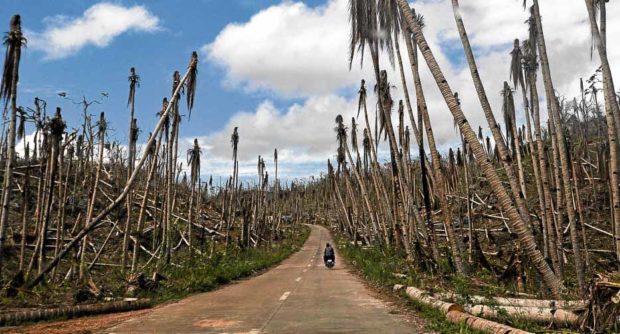
FURY OF ‘YOLANDA’ A road in Guiuan, Eastern Samar, lined by damaged coconut trees in the aftermath of the 2013 typhoon. INQUIRER FILE PHOTO
MANILA, Philippines — The Food and Agriculture Organisation (FAO) recommends that the Philippines detect, warn, and take action for natural hazards and disasters that could affect crops and communities to mitigate the damage.
The FAO cites a report that the Philippines is the most at-risk country globally for extreme disasters like tropical cyclones and slow-onset events like droughts.
FAO senior resilience officer Hang Thi Thanh Pham has called for improved disaster management in the country, saying that new approaches are needed to ensure the safety and well-being of the nation’s inhabitants.
“We can’t keep managing disasters when they are already happening. We have to shift to managing the risk, understanding what other risks are there and how to prevent them,” Pham said in an orientation seminar on Anticipatory Action and Adaptive and Shock Responsive Social Protection held in Makati City on Thursday.
She also mentioned that COVID-19 and tropical cyclones have compounded natural threats.
Pham discussed Association of Southeast Asian Nations principles on disaster-responsive social protection and anticipatory action to handle catastrophes.
In a world where disaster strikes without warning, preparation is key, she said. Gathering information, assessing institutional capacity, designing a social protection scheme, and securing funds – these steps must be taken in advance.
Ruth Georget, FAO specialist in special protection, discussed these guidelines, emphasizing that the integration of anticipatory action and social protection will make “better use of existing systems to protect people before disasters, and enable social protection systems to improve scalability, timeliness, predictability, and adequacy of benefits in case of shocks.”
FAO defined anticipatory action as the steps taken “to prevent or mitigate potential disaster impacts before a shock or before acute impacts are felt,” while social protection is the policies and programs beneficial for individuals and societies to manage risk and protect them from poverty and inequality.
During this case study, she talked about how quick action helped during a drought in Mindanao that was caused by El Niño and was discovered by FAO in July 2018. She emphasized the power of taking preventative measures.
She reported that months after their monitoring process, the World Health Organization announced the “70 percent chance of El Niño in the last quarter of 2018 through early 2019” in the country.
FAO warned locals in Mindanao of drought conditions which could affect the 2018 crop harvest and early 2019 planting, and implemented projects such as small-scale pumps, irrigation systems, vegetable seeds, drought-tolerant rice seeds, fertilizers, mallard ducks, cash-for-work aid, and more.
RELATED STORIES:
FAO warning: Climate change poisons food
World food price index eased further in November, says FAO

